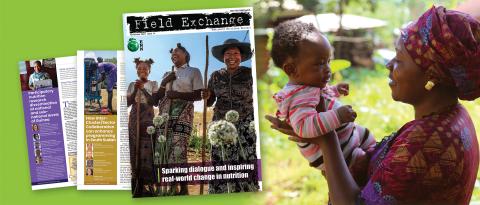Review of perinatal nutrition strategies in low- and middle-income countries
This is a summary of the following paper: McDonald C, Wessells K, Stewart C et al (2024) Perinatal intervention strategies providing food with micronutrients to pregnant and breastfeeding women in low‐and middle‐income countries: A scoping review. Maternal & Child Nutrition, e13681. https://doi.org/10.1111/mcn.13681
In resource-constrained settings, pregnant and breastfeeding women and girls are especially prone to undernutrition. This scoping review examined 149 research articles on nutritional interventions in low- and middle-income countries, focusing on 21 trials and programme evaluations using fortified lipid-based nutrient supplements (LNS), fortified blended flours, milk-based beverages, and local foods, providing 118-750 kcal/day. The review evaluated the impact of these products on maternal, infant, and/or child nutrition and health outcomes, and also assessed intervention acceptability and adherence.
Among six LNS studies evaluating gestational weight gain, two reported positive effects, while four found no significant differences. LNS supplementation also showed mixed results regarding gestational age and maternal haemoglobin concentrations, with some studies reporting benefits and others showing no significant effects compared to standard iron and folic acid or multiple micronutrient supplements.
Maternal outcomes were inconsistently reported across trials evaluating fortified blended flours. One trial found lower rates of inadequate gestational weight gain (84% vs. 91%) and preterm birth (2.1% vs. 7.1%, p=0.04) with corn soy blend plus compared to control, while other trials did not show significant differences. Two trials reported lower anaemia prevalence among women receiving corn soy blend plus and iron supplements compared to iron alone.
Few maternal outcomes were evaluated in trials with alternative supplements, such as fortified milk or snacks. There were 15 studies that assessed the effects of micronutrient-rich food supplements during pregnancy on birth outcomes. Small-quantity LNS increased birthweight by 40-85g in three out of four studies. Medium-quantity LNS also showed benefits in some trials, while others found no significant differences. Small-quantity LNS reduced stunting in two studies. However, effects on head circumference, mid-upper arm circumference, and neonatal mortality were mixed. There was limited data on food-based supplements, with some studies showing minor benefits for birthweight and child growth. Overall, multi-component interventions, including food supplements, generally showed positive outcomes in birthweight and child growth.
There were nine studies that assessed the acceptability of various supplements, with most focusing on LNS and corn soy blend plus, which were generally well received. Common barriers to consumption of these supplements included odour and taste aversion and concerns about large babies. LNS adherence in trials was high (over 75%), while adherence to fortified blended flours ranged from 40% to 60%. LNS adherence was typically higher than corn soy blend plus adherence.
The review concluded that the evidence on the provision of balanced energy protein along with multiple micronutrient supplements, through fortification or as supplements, to pregnant and breastfeeding women and girls in low- and middle-income countries on maternal outcomes and longer‐term infant and child growth is promising yet inconsistent. The authors highlighted the broad range of nutrient composition of the products trialled across the different studies. Additional research is needed on the cost-effectiveness of these products, especially in programme settings, and on the impact of multi-component interventions, and those providing cash.


